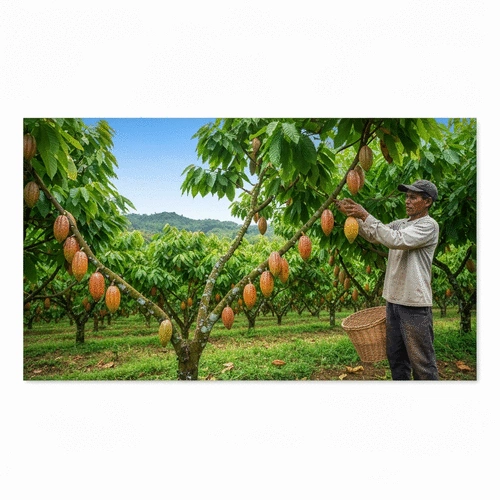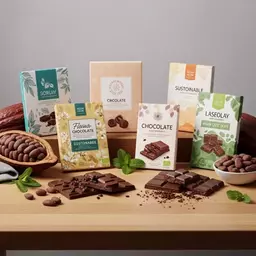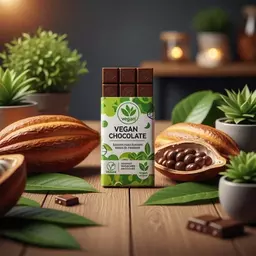As we indulge in our favorite vegan chocolates, have we ever considered the journey our treats take from farm to bar? Sustainable cacao farming not only enriches our taste experience but also fosters a healthier planet and equitable communities.
What You Will Learn
- Sustainable cacao farming promotes environmental stewardship and social equity, benefiting both the planet and local communities.
- Key practices of sustainable cacao farming include agroforestry, organic farming, and adherence to Fair Trade standards.
- Choosing vegan chocolate made from sustainably sourced cacao enhances flavor quality and supports ethical farming practices.
- Cacao genetic diversity is crucial for resilience against pests and climate change, contributing to richer and unique chocolate flavors.
- To identify truly sustainable vegan chocolate brands, look for certifications, ingredient transparency, and customer reviews.
- Educating yourself and advocating for ethical sourcing can promote sustainability within the chocolate industry.
- Supporting brands that prioritize ethical cacao sourcing helps uplift local farmers and contribute to community development.
Key Pillars of Sustainable Cacao Farming
Sustainable cacao farming balances environmental stewardship, social equity, and economic viability. Here are the three core areas that define this approach. For more tips on making informed choices, check out our vegan chocolate buying tips.
Understanding Sustainable Cacao Farming and Its Importance
As a vegan chocolate enthusiast, I can't stress enough the importance of sustainable cacao farming in creating delicious and ethical treats. Sustainable cacao farming means growing cacao in a way that supports the environment, local communities, and the economy without compromising the quality of chocolate we all love. It’s about a harmonious relationship between nature and the farmers who cultivate these beans, ensuring that we’re indulging in guilt-free chocolate.
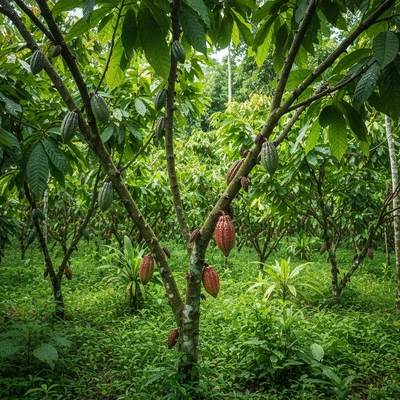
This approach not only protects the ecosystem but also promotes a healthier future for the chocolate industry. By understanding sustainable cacao farming, we can appreciate the journey of our beloved vegan chocolate from farm to bar, making more informed choices in our indulgences.
Defining Sustainable Cacao Farming
So, what exactly is sustainable cacao farming? It's a method that focuses on environmental stewardship, social equity, and economic viability. This means farmers use techniques that preserve the land and its resources while ensuring fair treatment and wages for workers. Here are some key elements:
- Agroforestry: Integrating cacao trees with other crops to enhance biodiversity.
- Organic Practices: Avoiding synthetic fertilizers and pesticides that harm the environment.
- Fair Trade Standards: Ensuring farmers receive fair compensation for their products.
Sustainable cacao farming is not just a trend; it’s a necessary evolution in how we grow and consume chocolate. Every change we make in our purchasing habits can support this critical movement! For more on how vegan choices impact the environment, see our article on vegan chocolate and environmental impact.
The Connection Between Cacao Farming and Vegan Chocolate
When we talk about vegan chocolate, it’s crucial to understand its roots. The connection between sustainable cacao farming and vegan chocolate is profound. Vegan chocolate relies on high-quality cacao, and sustainable practices ensure that we get the best flavors while supporting ethical farming. By choosing vegan chocolate made from sustainably sourced cacao, we’re actively participating in a movement that values both taste and ethics.
Here’s why this connection matters:
- Flavor Quality: Sustainably grown cacao has a richer flavor profile.
- Community Impact: Supporting sustainable farms uplifts local communities.
- Environmental Benefits: Helps combat deforestation and promotes biodiversity.
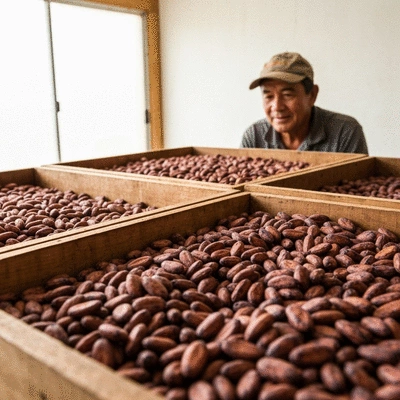
The Role of Cacao Genetic Diversity in Sustainable Practices
Cacao genetic diversity plays a vital role in sustainable farming. By preserving a wide array of cacao varieties, farmers can cultivate plants that are more resilient to diseases and climate change. This diversity not only ensures a stable supply but also enhances the flavor complexity of the chocolate produced.
Here’s how genetic diversity benefits cacao farming:
- Resilience: Diverse cacao plants can withstand pests and diseases better.
- Flavor Profile: Different varieties contribute unique tastes and aromas to chocolate.
- Adaptability: Diverse genetics help farmers adapt to changing environmental conditions.
As we embrace these sustainable practices, we can enjoy our vegan chocolate knowing we’re supporting a system that values both the planet and its people.
Pro Tip
When selecting vegan chocolate, always look for the Rainforest Alliance certification. This not only ensures the cacao is sustainably sourced but also supports biodiversity and the well-being of local communities. By choosing certified products, you're making a positive impact with every delicious bite!
Frequently Asked Questions About Sustainable Cacao Farming
What is sustainable cacao farming?
Sustainable cacao farming is a method of growing cacao that prioritizes environmental stewardship, social equity, and economic viability. It involves practices like agroforestry, organic farming, and fair trade standards to ensure a healthy planet, fair treatment for farmers, and long-term stability for the cacao industry.
Why is sustainable cacao farming important for vegan chocolate?
Sustainable cacao farming is crucial for vegan chocolate because it ensures high-quality cacao, which is the primary ingredient. It also supports ethical practices, meaning your vegan chocolate not only tastes good but also contributes to fair wages for farmers, community development, and environmental protection.
How does cacao genetic diversity contribute to sustainability?
Cacao genetic diversity helps sustainable farming by providing plants that are more resilient to pests, diseases, and climate change. This diversity also enriches the flavor profile of chocolate and allows farmers to adapt to changing environmental conditions, ensuring a stable and diverse supply of cacao.
What certifications should I look for when buying sustainable vegan chocolate?
When buying sustainable vegan chocolate, look for certifications such as Fair Trade, Rainforest Alliance, or USDA Organic. These certifications indicate that the cacao has been sourced in accordance with recognized sustainable and ethical standards.
How can consumers support ethical sourcing in the chocolate industry?
Consumers can support ethical sourcing by educating themselves about the cacao industry, choosing brands with transparent sourcing practices and certifications, advocating for change on social media, supporting local initiatives, and engaging with brands to inquire about their practices.
Taking Action: Supporting Sustainable Cacao Farming
As a passionate advocate for vegan chocolate, I believe that supporting sustainable cacao farming is crucial for both our planet and our taste buds! So how can you, as a conscious consumer, make a difference when it comes to enjoying your favorite vegan treats? Let's explore how to identify truly sustainable vegan chocolate brands and take actionable steps toward ethical sourcing.
How to Identify Truly Sustainable Vegan Chocolate Brands
When searching for sustainable vegan chocolate, it’s essential to look beyond the label. Not all brands are created equal, and understanding what to look for can help you make informed decisions.
- Check for Certifications: Look for recognized certifications such as Fair Trade, Rainforest Alliance, or USDA Organic, which indicate adherence to sustainable farming practices.
- Research the Brand's Story: Brands that prioritize sustainability often share their sourcing methods and farming partnerships on their websites.
- Ingredient Transparency: Pay attention to ingredients; high-quality cacao and natural sweeteners can indicate a commitment to ethical practices.
- Read Reviews: Customer feedback can provide insights into a brand's ethical practices and product quality.
By taking the time to research and choose the right brands, you can enjoy delicious chocolate while supporting ethical farming practices that benefit cacao growers and the environment.
Steps for Consumers to Promote Ethical Sourcing
Promoting ethical sourcing doesn’t just stop at choosing the right products. There are several proactive steps you can take to help foster a culture of sustainability.
- Educate Yourself: Stay informed about the cacao industry, sustainable practices, and the importance of ethical sourcing.
- Advocate for Change: Use your voice on social media to promote sustainable brands and share your passion for ethical chocolate.
- Support Local Initiatives: Participate in or donate to local organizations that promote sustainable cacao farming.
- Engage with Brands: Don’t hesitate to reach out to brands and ask about their sourcing practices—your inquiries can encourage change!
Each of these steps can contribute to a larger movement towards sustainability, ensuring that we all enjoy chocolate that is not only delicious but also ethical. For inspiration, explore easy vegan chocolate recipes at home.
Contributing to Community Development Through Chocolate Consumption
Did you know that your love for vegan chocolate can also promote community development? By choosing to support brands that prioritize ethical cacao sourcing, you can help uplift entire communities!
- Support Local Farmers: Many sustainable brands work directly with smallholder farmers, which helps to strengthen local economies.
- Empower Women in Cacao Farming: Some brands specifically focus on empowering women farmers, creating opportunities and equality in the cacao industry.
- Invest in Education: Ethical brands often contribute to educational programs for cacao farmers and their families, promoting long-term community benefits.
- Encourage Sustainable Practices: When you choose ethical brands, you indirectly encourage sustainable farming practices that protect the environment.
As you indulge in your chocolate cravings, remember that each bite can make a difference. Supporting sustainable cacao farming isn’t just a choice; it’s a way to contribute positively to the world around us! So, go ahead and treat yourself to that delicious vegan chocolate—you’re helping to create a better future.
Recap of Key Points
Here is a quick recap of the important points discussed in the article:
- Sustainable Cacao Farming: Emphasizes environmental stewardship, social equity, and economic viability.
- Connection to Vegan Chocolate: Sustainable practices ensure high-quality cacao while supporting ethical farming.
- Cacao Genetic Diversity: Preserving a variety of cacao enhances resilience and flavor complexity.
- Identifying Sustainable Brands: Look for certifications, research brand stories, and check ingredient transparency.
- Promoting Ethical Sourcing: Educate yourself, advocate for change, support local initiatives, and engage with brands.
- Community Development: Supporting ethical brands helps uplift local farmers, empower women, and invest in education.

